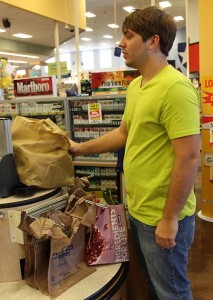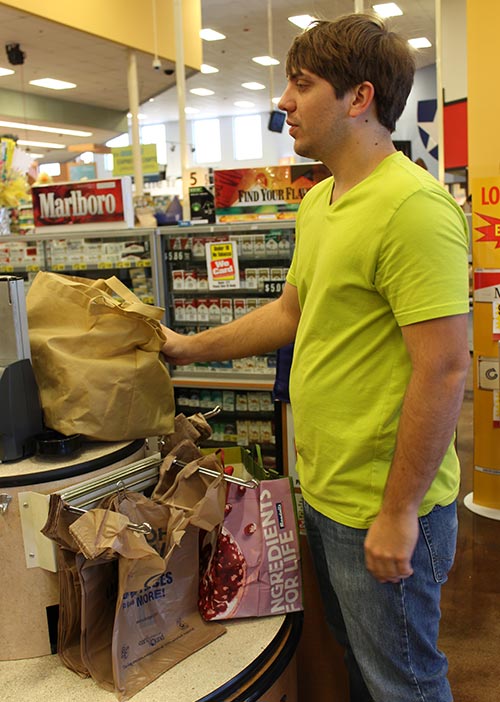Bag Bans Find Their Way To Texas
Veronica Lopez
The Signal
Efforts to reduce plastic bag litter motivated the Texas cities of Brownsville, Fort Stockton, South Padre Island and Austin to adopt single-use plastic bag bans and prompted several Texas councilmen to push bans in their cities.
Austin was the most recent city in Texas to enforce a single-use bag ban. It went into effect March 1. It regulates types of bags stores can provide to consumers by banning single-use, light-weight plastic bags and single-use paper bags, and replacing them with reusable bags.The ban permits reusable plastic bags a minimum of 4 millimeters thick and paper bags containing a minimum of 40 percent recycled content, which will increase to a minimum of 80 percent recycled content by March 1, 2014. The ban states all reusable bags must have handles whether they are made of plastic, paper or cloth.

These bag regulations are intended to reduce the number of single-use plastic bags that litter communities, highways, waterways, sewage systems and landfills, which in turn can save marine animals and wildlife.
In 2012, Houston Councilman Ed Gonzalez proposed a bag ban to the Houston city council. One of his primary reasons is a current problem concerning single-use plastic bags clogging waterways. This puts increased stress on an already vulnerable flood risk and it costs an estimated $1 million annually to clean just one section of Buffalo Bayou.
“If you go down to the waterways of Buffalo Bayou near downtown, plastic bags are all over and they cause quicker flooding because water rises faster and it costs about $1 million per year to get down there and clean up plastic bag debris,” Gonzalez said.
Dallas city council rejected the idea of a bag ban in the past, but Councilman Dwaine Caraway believes it is urgent they reconsider. Soon after Austin’s ban went into effect he requested an ordinance be composed immediately by city attorney Tom Perkins for council review. Caraway stated the amount of plastic bag litter is too extreme to wait to figure out who is responsible for cleaning it.
“Plastic bags are airborne and are all over fence lines and in the water,” Caraway said. “One bag today means 100 in five years in one location, and someone has to be responsible for cleaning it up and we need to act right now to find an alternative.”
Brownsville was the first city in Texas to enforce a single-use plastic bag ban in January 2011, which has produced positive results concerning plastic bag litter.
“We continue to assess the effects of the ordinance and find that litter of single-use bags has declined,” stated Beulah Mendez-Ramirez, of the Brownsville Public Health Director’s office.
Although single-use bag bans have support from councilmembers and produce positive results, there are those who fight to stop them. One group is the Texas Retailers Association (TRA), who claim Austin’s bag ban violates Texas Health and Safety Code because Section 261.0961 states “A local government or other political subdivision may not adopt an ordinance, rule, or regulation to: prohibit or restrict, for solid waste management purposes, the sale or use of a container or package in a manner not authorized by state law.”
In February the TRA filed a petition in Travis County District Court to clarify if Austin is in violation. President and CEO of the TRA Ronnie Volkening explained it is vital the court provide this because right now the validity of Austin’s ban is questionable.
“We are seeking a declaratory judgment from the court saying ‘we believe this state statute preempts the city of Austin’s actions’ and therefore we want a ruling to support that,” Volkening said.
Volkening realizes the accused code violation should have been noticed by the court and the TRA prior to the ordinance passing.
“No one was aware of the statute at the time, no one brought it up, and we should have known as well as Austin, but later an attorney working on a separate matter brought it to our attention,” Volkening stated.
Early in March Texas Representative Drew Springer, R-Muenster, filed the Shopping Bag Freedom Act which could overturn Austin’s bag ban. Springer has reported the act is about consumers’ rights to make their own decisions. He also wants Austin’s ban killed because he believes reusable bags pose serious health threats, such as E. coli, because people do not wash them.
The American Progressive Bag Alliance (APBA) is an organization comprised of American plastic bag manufacturers focused on protecting jobs and their industry by promoting bag reuse, litter prevention and recycling opportunities; correcting plastic bag misperceptions and myths; and aiming to stop bag bans.
APBA’s spokesperson Donna Dempsey stated 30,800 American manufacturing jobs are at risk nationwide from bag bans.
“Enough bans on the products we produce will inevitably threaten jobs,” Dempsey said. “Defending our employees’ livelihoods is a priority for our entire industry.”
Both sides of the bag ban issue agree education is the key.
“The most important thing is that council continues a dialogue concerning the issue so every option on what might work can be considered, and we must make every effort to educate communities,” Gonzalez said.
Volkening believes the alternative to bag bans is educating about “reduce, reuse, recycle” programs.
“The entire plastic bag litter problem stems from people not learning how to reduce, reuse and recycle, so we need to focus first on educating and spend a little money there instead of on training for bag ban transitions,” Volkening said.


[…] In this slideshow The Signal reporter Lauren Lowry takes a closer look at the various bag bans that have been implemented in Texas. Click here to read the article “Bag bans find their way to Texas” by The Signal reporter… […]
If they ban plastic bags and paper bags are pretty much out now and reusable nylon bags are now getting a bad rap since researchers now say only 3% of the nylon bags are washed and carry harmful bacteria what is left?